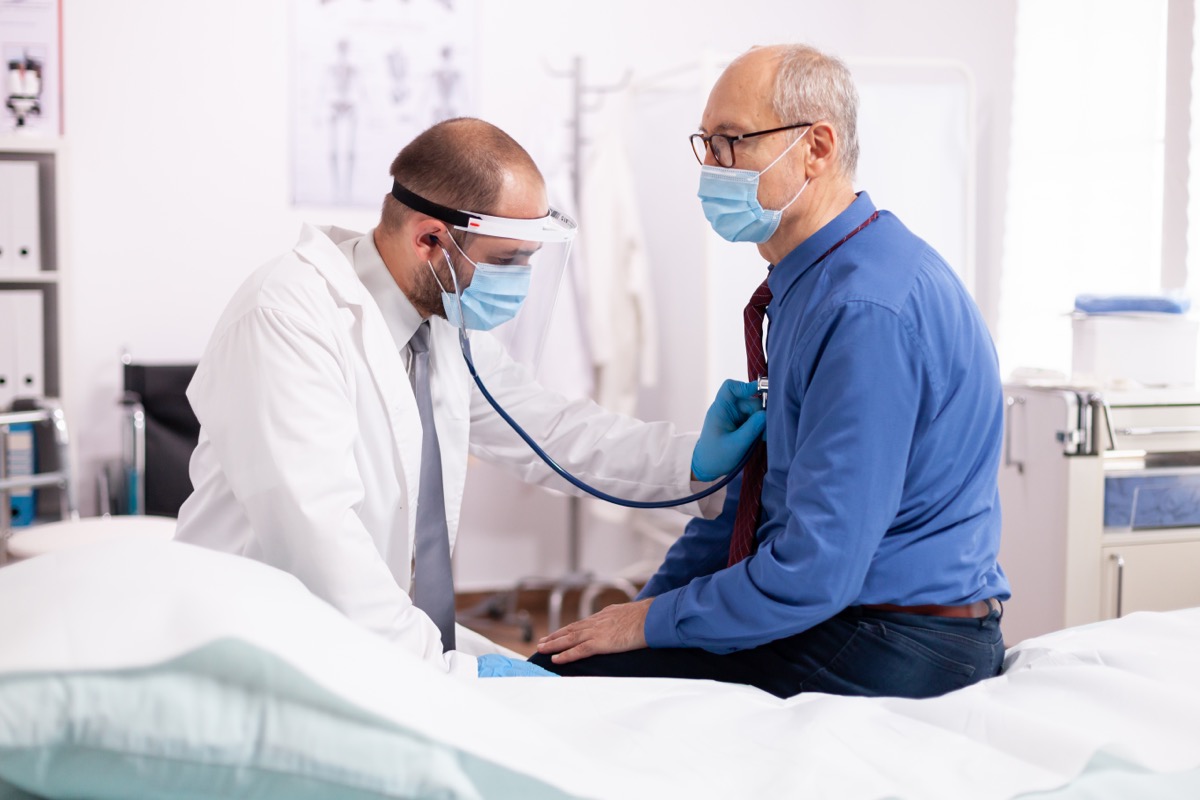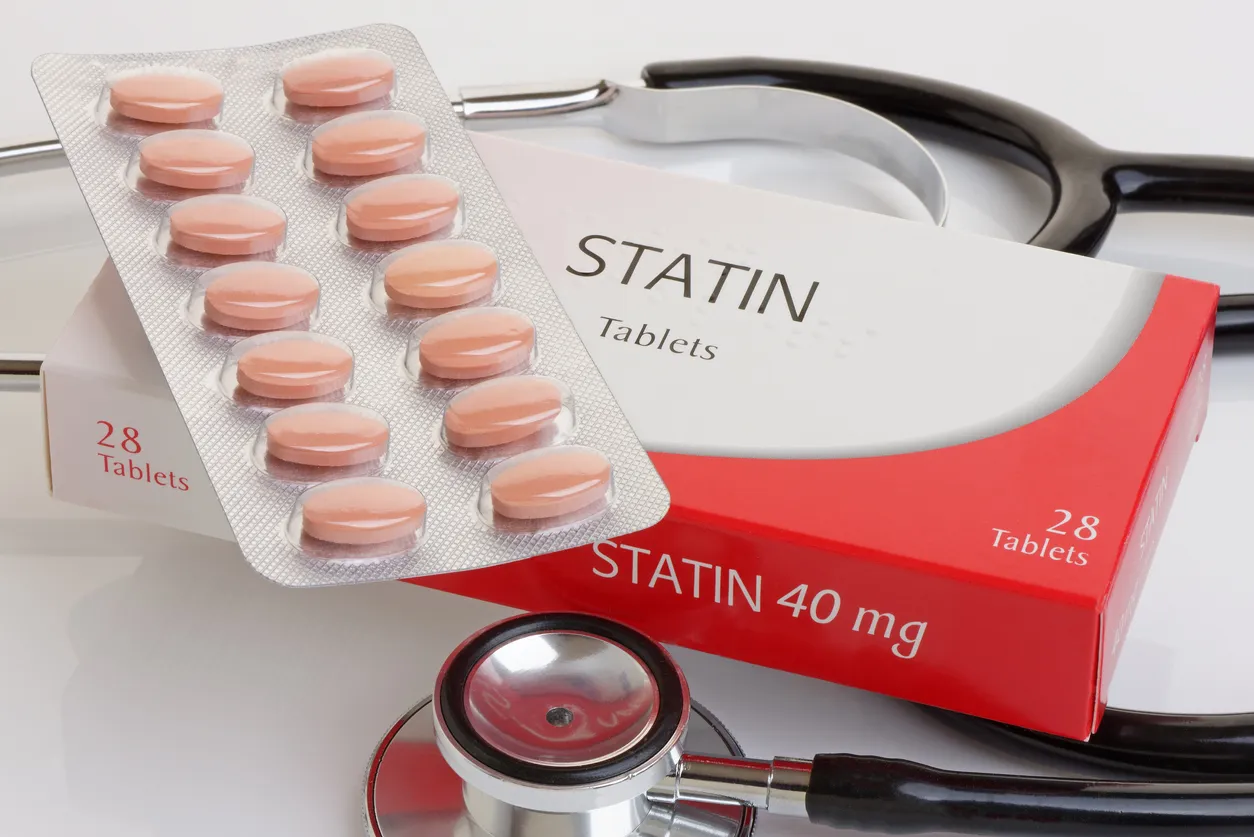New Treatment Could Halve Your Cholesterol, Researchers Say—And It’s Not Statins

If you live in the U.S., it’s not uncommon to have high cholesterol. Almost two in five adults are diagnosed with the condition, which puts you at risk for heart disease and stroke, according to the Centers for Disease Control and Prevention (CDC). Those are the two leading causes of death in the country, so if your doctor says your cholesterol has become problematic, you should address it immediately.
One of the best ways to do so is by making lifestyle changes like increasing exercise and switching up your diet. If that doesn’t work, your doctor may prescribe a statin. However, recent research found that the daily medication might not be necessary after all. Read on to find out about a groundbreaking new treatment that could halve your cholesterol.
RELATED: 4 Foods That Lower Your Cholesterol, According to Dietitians.
A new study found it’s possible to lower cholesterol without statins.

A new study released this month by Verve Therapeutics at a meeting of the American Heart Association (AHA) revealed groundbreaking results that suggest a possible new treatment for high cholesterol, according to The New York Times. The therapy uses gene-editing technology and only requires one infusion for lifelong protection from heart disease, making it somewhat similar to a vaccine.
For the study, Verve recruited 10 patients with a condition that causes severe heart disease, which led to chest pain and heart attacks. The patients had each tried medication to get their cholesterol in check, but hadn’t been able to reach a healthy level.
The three patients who received the highest doses of the gene-editing treatment saw their low-density lipoprotein (LDL) cholesterol (or bad cholesterol) fall between 39 and 55 percent. This put them closer to their goal of a healthy cholesterol level.
RELATED: New Single Shot Shown to Slash High Blood Pressure for 6 Months, Researchers Say.
Here’s how the treatment works.

Gene-editing technology sounds futuristic—and it is, in many regards. The treatment involved giving patients an infusion of microscopic lipid nanoparticles that could permanently deactivate the gene PCSK9, which is active in the liver and raises LDL cholesterol, according to Nature.
“Instead of daily pills or intermittent injections over decades to lower bad cholesterol, this study reveals the potential for a new treatment option—a single-course therapy that may lead to deep LDL-C lowering for decades,” said senior study author Andrew M. Bellinger, MD, PhD, per the AHA.
This type of treatment was previously believed to be improbable for patients with high cholesterol.
“Until now, we thought of gene editing as a treatment we should reserve for very rare diseases where there is no other treatment,” Daniel Skovronsky, MD, chief scientific and medical officer of the pharmaceutical company Eli Lilly, which plans to collaborate with Verve on future research, told the NYT. “But if we can make gene editing safe and widely available, why not go after a more common disease?”
After the study, experts decided the treatment appeared to be safe.
RELATED: Common Statin Spikes Diabetes Risk, New Study Finds.
The study had some complications.

Although the researchers ultimately decided that the treatment appeared safe, the study had its hiccups. One participant died from cardiac arrest five weeks after the infusion, and another had a heart attack the day after the infusion.
However, “the study’s independent data safety and monitoring board deemed [these reactions] a result of their underlying severe heart disease,” per the NYT. They advised the researchers to continue the study.
Verve’s share price sank nearly 40 percent after the results of the study—and news of these events—was released, explained Nature. The company will continue its trial in 2024.
It could eliminate the need for statins.

If the gene-editing treatment were to become widely available, it could transform the future of cardiology by minimizing the need for statins. According to the NYT, less than 60 percent of patients who are diagnosed with heart disease take a statin, and only a quarter take one of the more effective ones.
One 2021 study found that only 55 percent of those who were prescribed a statin were still using it after six months, according to NBC News. It’s not difficult to guess why: Statin side effects can include muscle pain, liver damage, memory loss, confusion, and increased blood sugar, per the Mayo Clinic.
“No symptoms are associated with high cholesterol levels, so it’s difficult to convince patients that they need to take a medication for prevention before the catastrophe happens,” Steven Nissen, MD, chairman of Cardiovascular Medicine at the Cleveland Clinic, told NBC News.
With the potential for a new one-and-done treatment, however, all that could change.
RELATED: For more up-to-date information, sign up for our daily newsletter.
Best Life offers the most up-to-date information from top experts, new research, and health agencies, but our content is not meant to be a substitute for professional guidance. When it comes to the medication you’re taking or any other health questions you have, always consult your healthcare provider directly.